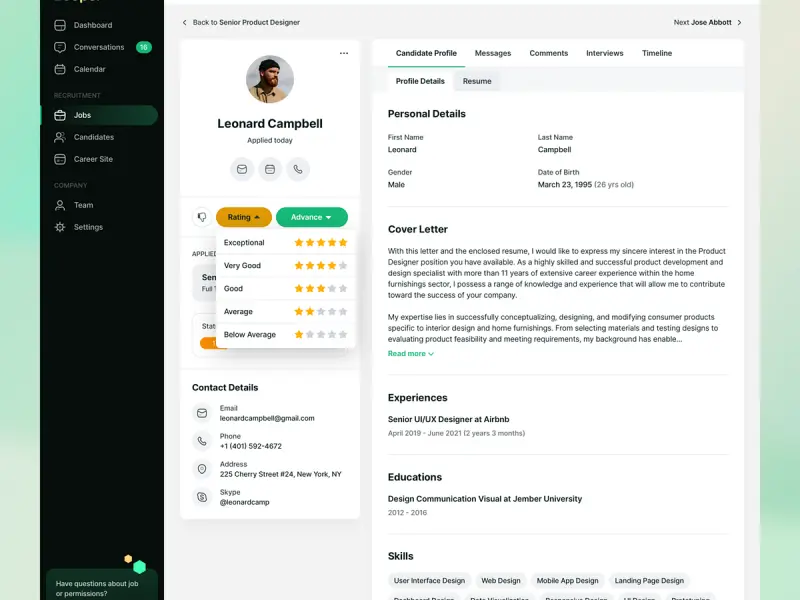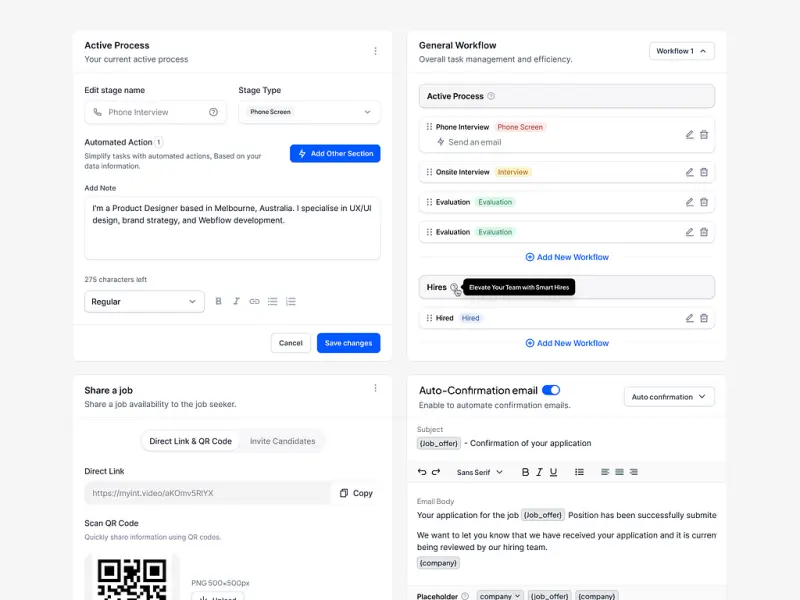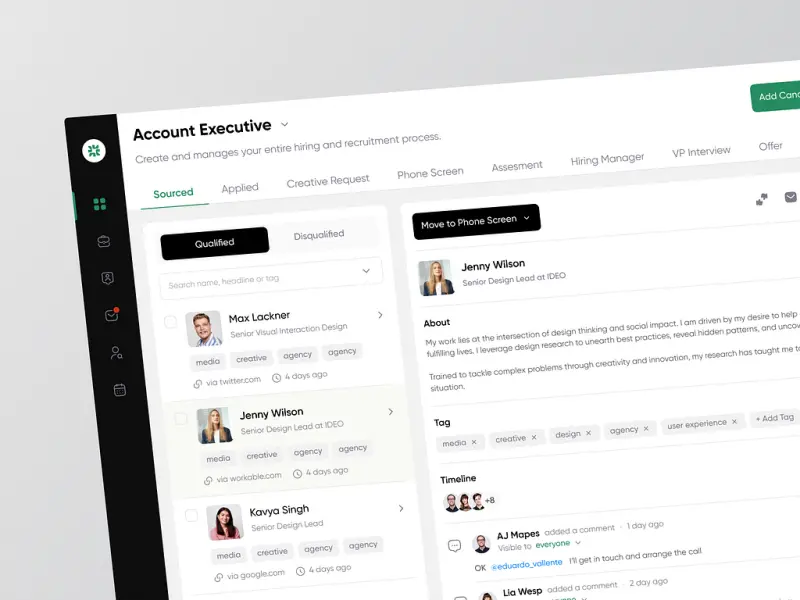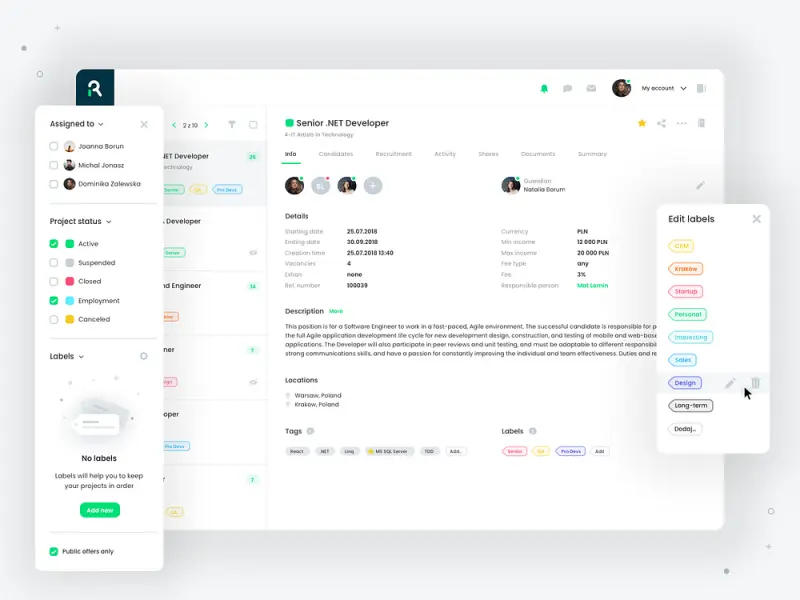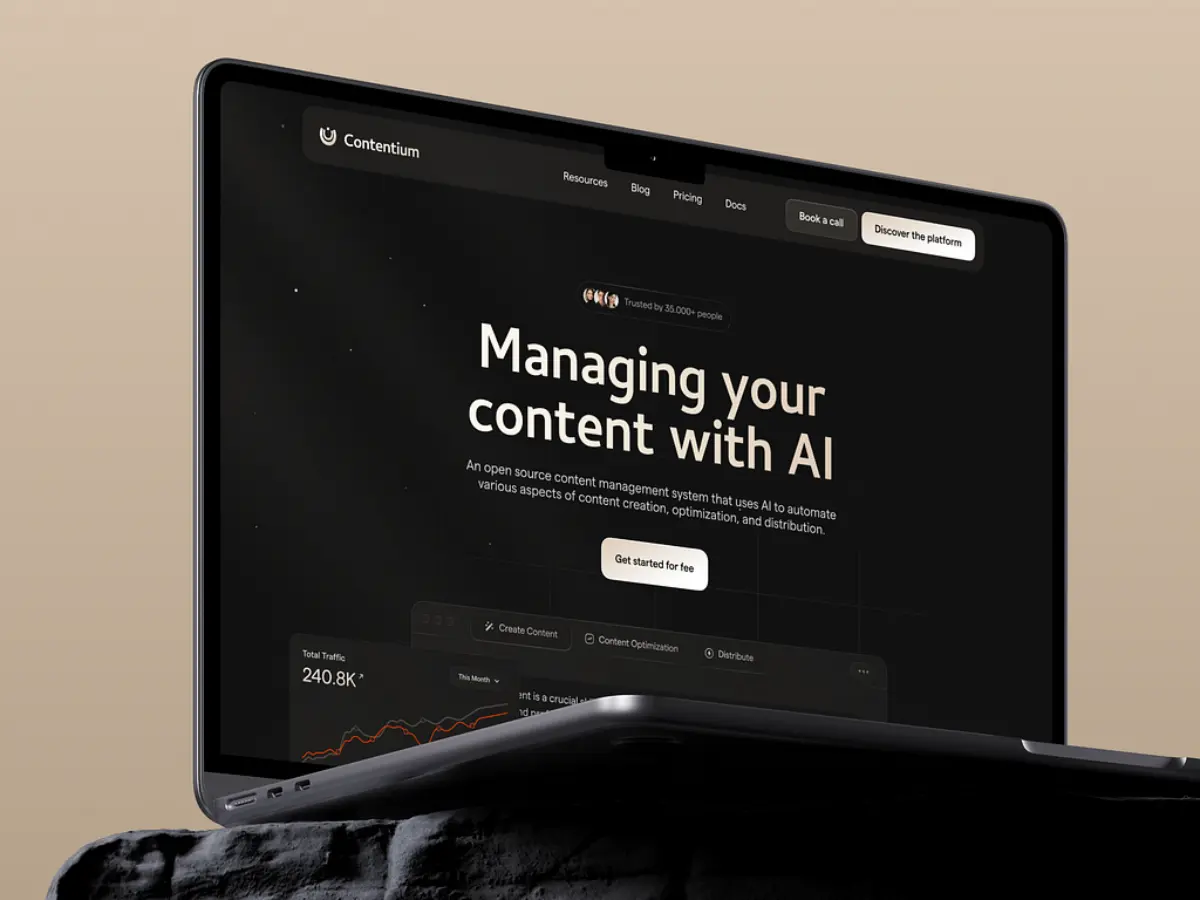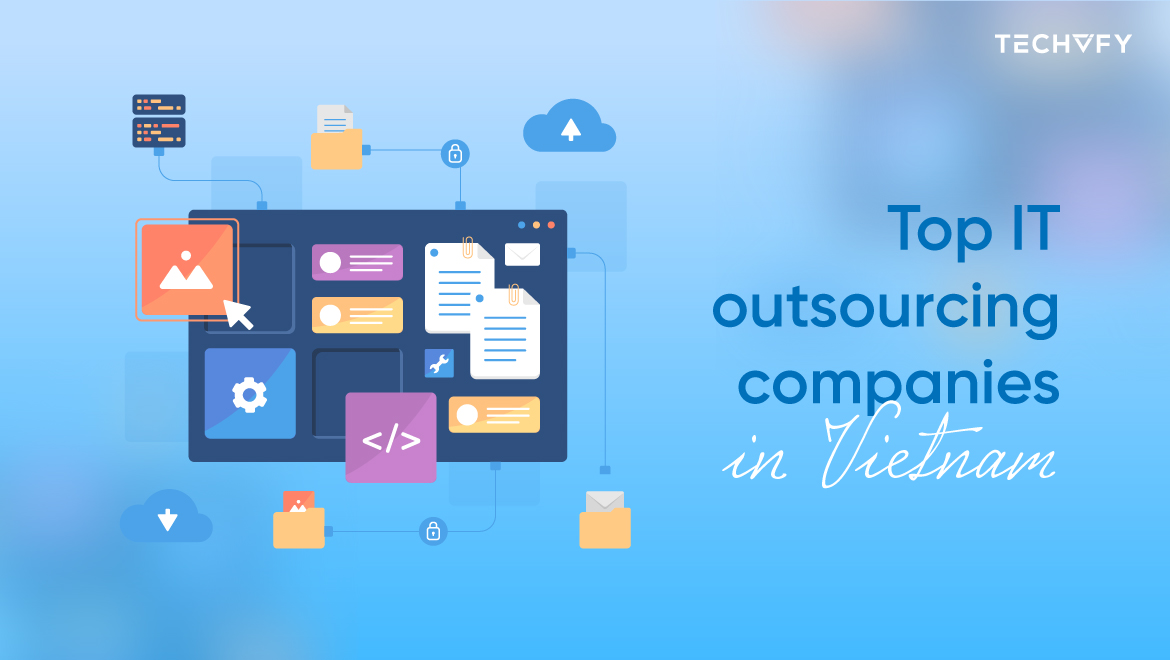Artificial Intelligence in Recruiting Process – The Key to Faster, Smarter Recruitment
- TECHVIFY Team
- 0 Comments
Artificial intelligence (AI) is significantly transforming how companies approach recruitment. It’s no wonder that 43% of Human Resources professionals have already integrated AI into their hiring processes. This swift adoption is largely due to the growing recognition of AI’s potential to enhance recruitment strategies. With the global AI market projected to surpass $1.8 billion by 2030, it’s clear that this technological shift is becoming a permanent fixture in the industry.
Recruiting new employees is a demanding process that requires significant resources and time. From finding and screening candidates to conducting interviews and evaluating talent, recruiters face a host of challenges in matching the right candidate to the company’s needs. However, the advent of AI has begun to streamline many of these tasks, allowing hiring managers to save both time and resources. In this discussion, we will examine artificial intelligence in recruiting process and highlight its advantages to businesses.
I. Understand AI in the Recruiting Process
AI in recruitment involves utilizing AI technologies to improve and automate different stages of the hiring process. By harnessing AI, recruiters can utilize data-driven insights to make more informed decisions. AI tools can assist in sourcing and screening candidates, analyzing resumes and job applications, conducting pre-employment assessments, and even predicting a candidate’s potential success and cultural fit within the organization.
AI in the hiring process
By adopting AI, recruiters can help minimize the time and effort needed to identify the right candidates, improve the quality of matches, minimize bias, and base their decisions on data. AI’s role in recruitment has the power to transform the hiring process, making it more efficient, accurate, and effective in identifying and attracting the right talent for organizations.
Learn More On:
II. The Importance of AI in Modern Recruitment
AI is rapidly becoming an essential tool in the recruitment process. It enables teams to enhance efficiency and focus on long-term objectives. By automating routine tasks, AI allows recruiters to concentrate on strategic goals that contribute to the organization’s overall success.
Here are four compelling reasons why recruiters should stay informed about AI’s role in the hiring process:
Enhance Recruitment Productivity
Recruitment often involves time-intensive, repetitive tasks. On average, recruiters dedicate up to 30 hours each week to administrative activities like sourcing candidates, reviewing resumes, scheduling interviews, and coordinating with the hiring team. This can lead to a significant drain on productivity. AI-driven tools can rapidly process and filter large volumes of applications, identifying qualified candidates almost instantly. By automating these laborious tasks, HR teams can cut down on administrative hours and redirect their efforts toward more strategic endeavors that drive organizational success.
Mitigate Unconscious Bias in Hiring
Unconscious biases often influence recruitment decisions, which can lead to choices that do not align with an organization’s values or diversity goals. Almost half of HR managers admit that unconscious bias affects their hiring decisions. This can result in poor hiring outcomes and limit efforts to build a diverse workforce. When properly applied, AI technology can help reduce these biases by providing objective assessments based on qualifications and experience rather than subjective factors like age, gender, or race. This leads to fairer and more inclusive hiring practices.
Elevate the Candidate’s Experience
A slow and impersonal recruitment process can deter job seekers, leading to a negative candidate experience. Research shows that nearly 60% of candidates have turned down job offers due to poor recruitment experience. This discourages future applicants and can damage your employer’s brand. AI-powered recruitment tools can streamline the application process, making it faster and more engaging for candidates. By leveraging AI to create a more personalized and efficient recruitment experience, you can attract top-tier talent and improve overall candidate satisfaction.
Increase the Quality of New Hires
Employees are the cornerstone of any organization, and a single bad hire can have serious repercussions on productivity and financial performance. The U.S. Department of Labor estimates that a poor hire can cost a company 30% of that employee’s first-year salary. Some experts suggest that the cost could be even higher, ranging from $240,000 to $850,000 per bad hire. AI can help mitigate these risks. When combined with traditional hiring methods, AI-driven recruitment solutions can analyze candidates using data and analytics, providing valuable insights that empower managers to make more informed hiring decisions.
Have a Project Idea in Mind?
Get in touch with experts for a free consultation. We’ll help you decide on next steps, explain how the development process is organized, and provide you with a free project estimate.
III. Applications of Artificial Intelligence in the Recruiting Process
AI is revolutionizing recruitment by making hiring faster, smarter, and more cost-effective. Below, we explore how AI can enhance different stages of talent acquisition, leading to more efficient and effective hiring practices.
Streamlining Candidate Sourcing
AI-driven sourcing tools have allowed recruiters to find and engage with potential candidates more effectively. These tools employ algorithms and machine learning to automate tasks such as searching job boards, internal databases, and social media platforms for the most relevant candidates for a specific role. Many AI-powered sourcing tools also offer data-driven insights and suggestions, empowering recruiters to make better-informed decisions.
There are various AI-based sourcing tools on the market, each offering unique features and capabilities. Some tools focus on optimizing marketing efforts and engaging with candidates in real-time, while others feature AI chatbots that interact with candidates to determine role suitability and guide them through the application process. These tools offer numerous advantages, including faster candidate sourcing, increased accuracy, enhanced efficiency, and improved team collaboration.
Optimizing Candidate Screening
Screening applicants is a critical but often time-consuming step in the recruitment process. With large volumes of applications, manual screening can be labor-intensive. AI screening tools address this challenge by quickly extracting key information from resumes and applications, helping recruiters efficiently identify the most qualified candidates.
AI screening tools utilize various methods, from resume parsing to behavioral and skill assessments. For example, these systems can detect red flags such as incompatible personalities or behaviors that might not fit well with the role. The insights provided by AI screening tools empower recruiters to narrow down the candidate pool and focus on those with the highest potential, making the selection process more efficient.
AI in the recruiting process
Enhancing Talent Assessment
Companies are increasingly turning to AI-powered talent assessment tools to evaluate candidate competencies and personality traits comprehensively. These tools incorporate elements such as gamification, behavioral assessments, and skill testing to create a more engaging and efficient candidate evaluation process. The data generated by these assessments is analyzed by AI algorithms, which produce detailed reports on a candidate’s strengths, weaknesses, and personality traits.
Using AI in talent assessment saves time and resources and offers candidates an interactive way to showcase their abilities. Many AI-powered assessment tools are customizable to fit an organization’s specific needs and can be smoothly integrated with current systems to ensure an uninterrupted workflow.
Revolutionizing Candidate Interviews
Interviews are vital to hiring, providing direct insights into a candidate’s abilities and personality. Traditional interviews, however, can be time-consuming and resource-intensive. AI-enabled interview platforms alleviate this burden by streamlining the process and utilizing data and analytics to enhance decision-making. For example, these platforms allow recruiters to conduct pre-screening interviews via video calls or text-based interactions, which are then recorded and analyzed using machine learning algorithms to pinpoint the most promising candidates for further interviews.
AI interview tools also analyze voice and facial expressions to assess a candidate’s tone, demeanor, and emotional state. These insights, combined with the content of the candidate’s responses, offer a more holistic view of their personality and suitability for the role. Additionally, these platforms provide valuable metrics on candidate performance, such as response times and engagement levels throughout the interview.
Improving Offers and Onboarding
Creating a positive and engaging experience during the offer and onboarding stages is crucial for making a strong first impression on new hires. AI-based tools have made it easier for HR teams to deliver personalized and seamless onboarding experiences. These tools guide new hires through the initial stages of their employment, introducing them to the organization’s culture and helping them navigate their first days on the job.
AI and machine learning technologies enable these platforms to tailor the onboarding experience to the specific needs of each organization while also scaling the process to accommodate large groups of new hires. By focusing on employee engagement and delivering a positive onboarding experience, organizations can establish a strong foundation for a successful and productive relationship with their new employees.
IV. Different Types AI Tools for Modern Recruitment
AI and machine learning are transforming the recruitment landscape, offering valuable support to candidates, recruiters, employees, and management alike. These tools streamline various stages of the hiring process, enabling everyone involved to reach their goals with greater efficiency. Here’s how AI is enhancing key functionalities in recruitment:
Personalized Experiences Tools
AI drives personalization across the entire talent lifecycle by delivering customized content and recommendations. On company career sites, AI provides tailored job suggestions and dynamic content based on a candidate’s profile, search history, and location. This technology also ensures that employees benefit from similar personalized features within the talent marketplace, offering career path guidance, learning opportunities, mentoring, and referral suggestions.
For recruiters and management, AI curates a personalized talent pipeline by matching skills and compatibility, making it easier to discover new talent and reconnect with high-quality candidates from the past.
Artificial intelligence in the recruiting process
AI-Powered Conversational Chatbots
AI-driven HR chatbots facilitate faster and more personalized job searches for candidates. These chatbots engage in meaningful conversations, assist with job searching, screen candidates, and even handle interview scheduling. For instance, the Phenom chatbot has managed 20 million candidate interactions in just 12 months, using AI and machine learning to offer precise and relevant job recommendations.
To ensure accurate responses, the chatbot leverages a comprehensive database, utilizing natural language processing and understanding. This allows it to grasp the intent behind a candidate’s questions. Recruiters can further refine the chatbot’s capabilities by analyzing conversations and providing additional responses to meet candidates’ needs.
Talent CRM
A talent CRM (Customer Relationship Management) system helps recruiters build, engage, and track talent pipelines while boosting productivity through dynamic lists, actionable insights, and fit scoring. AI-driven insights within the CRM enable recruiters to easily identify and stay connected with top talent, enhancing the overall recruitment process.
Automated Interview Scheduling Tools
AI simplifies the interview scheduling process for candidates, recruiters, and hiring managers. By accessing team members’ calendars and syncing schedules, AI allows candidates to choose an interview time that works for everyone involved. This automation eliminates the need for back-and-forth communication, making the process seamless.
Powered by the CRM, this feature ensures that once a candidate selects a time, the interview is automatically added to everyone’s calendars, streamlining the scheduling process for all parties.
One-Way Video Assessments Tools
One-way video assessments, integrated into the CRM, offer candidates a chance to make a strong first impression while also simplifying the screening process for recruiters. This tool saves time for hiring managers by allowing them to review candidate videos at their convenience, providing valuable insights into candidate suitability.
With this technology embedded in Phenom CRM, recruiters and hiring managers can access all relevant candidate information in one place. They can prioritize the best-fit talent, showcase their employer brand through personalization, and gain insights into conversion rates and candidate data via assessment analytics.
V. Challenges of Integrating AI in Recruitment
Implementing artificial intelligence in the recruiting process can bring significant benefits, but HR teams must be mindful of certain challenges that come with it. Here are some of the key obstacles and strategies to overcome them:
Ensuring Quality Data for AI Systems
Data forms the backbone of any effective AI system. The success of an AI-driven talent experience platform largely depends on the quality and quantity of data it processes. Therefore, selecting the right platform is a critical decision. Organizations need to partner with a technology provider whose platform is powered by a comprehensive network of recruiters, candidates, employees, and job roles. This ensures that the AI system is fed the volume and diversity of data necessary to generate meaningful insights.
Artificial intelligence in recruiting process
Encouraging collaboration across the platform is also crucial. When users actively engage and contribute data to a centralized AI-driven system, the platform’s overall effectiveness is improved, resulting in better outcomes for the organization.
Gaining Widespread Support
Implementing artificial intelligence in hiring process often necessitates significant changes, which can be met with resistance. Recruiters might worry that AI will replace their roles and render them obsolete. Addressing these concerns is crucial by clarifying that AI is designed to augment, not replace, human roles. Human judgment and interaction will remain critical in recruitment, with AI serving as a tool to boost efficiency and support decision-making.
To ease the transition, leaders should offer demonstrations, live training sessions, and opportunities for employees to provide feedback before fully rolling out the AI system. Identifying and empowering change champions—enthusiastic about the technology and its benefits—can also help build excitement and gain widespread acceptance among all employees. These champions play a crucial role in facilitating a smooth transition and ensuring everyone is on board with the changes.
Conclusion
Artificial intelligence is revolutionizing recruitment, making processes faster, smarter, and more cost-effective. As AI continues to evolve, it will play an increasingly critical role in helping businesses attract, evaluate, and onboard top talent more efficiently.
However, successfully implementing artificial intelligence in recruiting process requires careful planning and the right technological partnerships. By embracing AI, organizations can enhance their recruitment strategies and build a more competitive, diverse, and innovative workforce.
Ready to transform your recruitment process with the power of AI? Let TECHVIFY be your trusted partner in this journey. Contact us today for a free consultation and discover how our top-tier development services can elevate your business. Let’s make your recruitment smarter, faster, and more effective—together.
TECHVIFY – Global AI & Software Solutions Company
For MVPs and Market Leaders: TECHVIFY prioritizes results, not just deliverables. Reduce time to market & see ROI early with high-performing Teams & Software Solutions.
- Email: [email protected]
- Phone: (+84)24.77762.666




